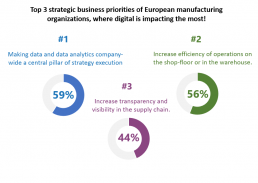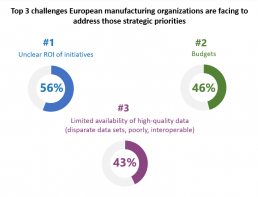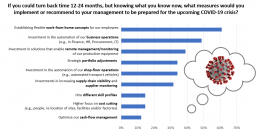2020 was a year of unprecedented challenges for manufacturers. On top of ongoing initiatives to digitally transform operations from the enterprise to the shop-floor level to the supply chain, manufacturers suddenly had to respond to COVID-19.
Before COVID-19, many manufacturers were trying to scale their digital transformation (DX) initiatives beyond the PoC stage, strategically transforming themselves from product-centric to customer-centric organizations. Embracing data, data integration, data analytics, and artificial intelligence (AI) was essential for continuous process improvement across the entire organization, from the shop floor to the enterprise level.
The pandemic, however, put immediate pressure on manufacturers to switch their focus to make their operations resilient. It also created a number of new challenges — how to ensure uninterrupted supply chains with a constant flow and availability of raw materials and other essential product components, how to keep workers safe, how to implement social distancing within the organization, and how to enable remote working.
To become more resilient and agile operations, manufacturers are increasingly turning to infrastructure technologies such as cloud. This enables them to not only shift capex to opex, thereby optimizing cash flow, but also to build the foundations for more scalable and resilient factory operations.
What Will the Future of Manufacturing Look Like?
Given the challenges of COVID-19, manufacturing organizations will have to redefine their journey toward a “future enterprise,” which will now also include being able to succeed in the next normal. We believe this will mean being able to manage not only unexpected events such as global pandemics, but also address the challenges of ongoing events that impact companies.
At IDC’s Manufacturing Executive Forum 2020, on November 24, 2020, almost 90 “live” attendees from manufacturing organizations across 15 countries in Europe discussed the key theme of the event — the new face of manufacturing, with a focus on being digital, connected, and more resilient than ever before. An impressive panel of speakers from IDC’s manufacturing CxO community as well as partners, complemented by insights from our European IDC manufacturing analyst team, explored industry trends and their impact on manufacturing.
12 Manufacturing Trends That Will Shape the Future Enterprise
The discussions helped us to highlight the following 12 key takeaways:
- Utilize digital technologies. Manufacturers should utilize new digital technologies that help them to become more efficient, more resilient, and more agile to prepare for the next normal.
- Scale Industry 4.0 solutions. Piloting and testing Industry 4.0 solutions with partners in a modular and flexible environment helps to speed up industrial process innovations and scale faster.
- Analyze processes. When initiating innovation pilots and trials, organizations should execute thorough feasibility analysis, supported by process simulation. They must focus on the right technology for the available skill levels and on fast ROI.
- Start utilizing AI now. Manufacturers should start utilizing AI at scale to optimize operations. The time for PoCs is over — it’s time to get AI out of the lab and into daily operations.
- Utilize AI for shop-floor operations. The role of Big Data, AI, and machine learning on the shop floor is significant because it enables not only the development of Industry 4.0 solutions but also prevents companies from being stuck with “old habits” and legacy processes that hinder progress and dull their competitive advantage.
- Use technology platforms. Manufacturers should choose the right technology platform that can accommodate a variety of use cases covering enterprise data, real-time data, community data, and so on at large scale.
- Focus on customer centricity. The ability to accommodate changing customer demands is key, not only in times of uncertainty but also in the long term to remain competitive and relevant.
- Leverage ecosystems. Manufacturers should leverage their ecosystem of suppliers, customers, partners, and peers much more than they did in the past to make their operations more efficient, become more resilient, and develop new business models.
- Look at new approaches to ecosystem collaboration. If manufacturers want to stay successful and competitive in the long run, they should look to engage in business ecosystems based on open innovation, joint risk taking/value creation, and data sharing.
- Target sustainable measures. Successfully implementing sustainability initiatives will require organizations to have an end-to-end view of all aspects of their delivery mechanisms in the entire supply chain, from raw materials to finished goods and in-service usage, all the way to disposal and recycling.
- Become agile. Manufacturers should view the disruption brought by COVID-19 as an opportunity to become more agile by starting to fully leverage technology that they have already invested in.
- Focus on commitment. Technology is never the limiting factor. People, and their commitment to make DX and related change processes happen, are the most important thing.
Top Strategic Business Priorities and Challenges for Manufacturing Companies in 2021
Before the IDC European Manufacturing Executive Digital Forum 2020, we asked delegates to take part in a pre-event survey about their strategic business priorities, the areas where digital is making the most impact, and the key challenges they face when addressing those strategic priorities. The results of the survey are shown in the following graphs:
Conclusion and Outlook
The IDC European Manufacturing Executive Digital Forum 2020 was very well received by our manufacturing CxO community and our partners as it provided an opportunity to get the latest insights from IDC and its partners, learn from best practices, and connect with peers.
Please feel free to access the recordings of our keynote presentations at our on demand version.
We’re very much looking forward to continuing this dialog in 2021. We’re already preparing for our next event, which will take place on November 18, 2021, so please stay tuned.
If you’re interested in joining our manufacturing CxO community or if you’d like to help us to create and shape the agenda for this year’s event, please reach out to Stefanie Naujoks (snaujoks@idc.com).




